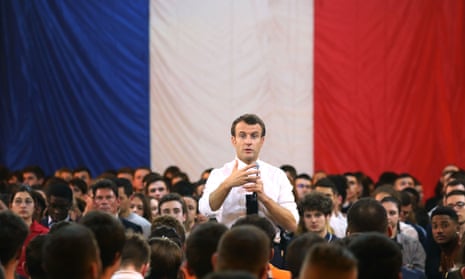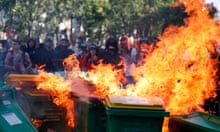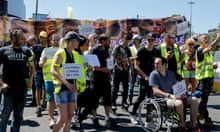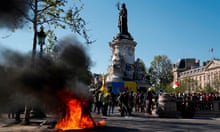On a windswept night in the northern French port of Cherbourg, Brigitte, a health insurance worker, stood up at a town hall meeting that she hoped might change the future of France.
“I hear a lot of people criticising the president’s wife, Brigitte Macron, for wearing designer trainers worth thousands of euros,” she said. “I understand she has to represent French designer brands. But let’s look at other presidential costs. Why doesn’t the president, Emmanuel Macron, entertain visiting heads of state more frugally? If he hosted state visits sitting on a bale of hay with a mug of cider, it would send a clear message to the rest of France on reducing unnecessary costs.”
One pensioner shouted: “And they could use paper plates, not the new presidential dinner plates they just spent €50,000 on!” A retired teacher said the German chancellor, Angela Merkel, went home at night and did her own shopping, yet France had a 365-room presidential palace that cost more than €100m a year to run. “That’s because in France we still have still a type of king,” sighed a trade unionist.
For four hours, more than 100 citizens thrashed out their views on fat-cat pay, inequality in the tax system and Macron’s much-criticised drive to privatise certain state-controlled enterprises. A 16-year-old volunteer logged all comments in neat writing to send to the presidency.
Macron’s “Great Debate” – a vast, unprecedented nationwide exercise in consulting citizens on how to fix France’s problems – is the latest attempt by the centrist president to try to bring an end to almost three months of spectacular anti-government revolt by the gilets jaunes or yellow vest movement.
Macron’s idea to run thousands of local meetings was at first likened by some critics to the ill-fated consultation exercise by King Louis XVI in 1789. The king sought to quell popular discontent, but instead kickstarted the French revolution. Four years later he lost his head at the guillotine.
The gilets jaunes continue to protest – one demonstrator lost part of his hand during clashes with police in Paris this weekend – but Macron’s dire approval ratings have slowly begun to rise in recent weeks. Only around 34% of French people say they approve of the way he runs France, but he has regained some support, mainly on the right but also among some on the left.

Two months ago, at the height of protests, it was hard for Macron to leave the confines of his presidential palace without getting heckled and jeered. Now he has made several six-hour appearances at carefully organised debates across France. Speaking to local mayors and select young people, he has rolled up his shirt sleeves and defended his policies through a handheld microphone in what has been nicknamed The Macron Show.
There is concern over whether citizens’ suggestions will be taken onboard. Macron has refused to change his stance on liberalising the economy and overhauling the welfare state, and the government is braced for protests to continue for several more months.
The street demonstrations in Paris this weekend showed a new focus of anger against political institutions, with the French parliament and senate targeted. One protester in Normandy on Saturday had “Bring back the guillotine” written on his yellow vest.
The country home of Richard Ferrand, the leader of the lower house of parliament and a key Macron ally, was targeted in an arson attack this weekend. No group claimed responsibility and the investigation is ongoing. Ministers blamed a climate of violence against politicians sparked by the gilets jaunes protests.
More than 80 MPs from Macron’s party, La République En Marche, are said to have been targeted with written threats or attacks on their homes and offices since the start of the revolt. One MP woke up to find her home’s driveway had been bricked up in the night. Others have had cars burnt and windows smashed.
Cherbourg, across the Channel from Dorset, has seen regular demonstrations. The industrial port and its surrounding villages face some of the problems that sparked the revolt in November. The area’s poor transport links means people depend on cars and expensive fuel. There are complaints about a lack of local doctors and the closure of public services in the countryside.
Many talked about a lack of trust in elected officials at the debate. “I don’t even know why I vote any more,” said one engineer.
Cherbourg’s MP, Sonia Krimi, won the traditionally leftwing town for Macron’s centrist party in 2017. She is known as an independent voice who has opposed some government moves, including a new law clamping down on protesters, on which 50 of Macron’s MPs abstained last week. She also raised eyebrows within her party for briefly donning a yellow vest during a meeting with protesters.

Leading the Cherbourg debate, she insisted Macron would take all issues raised into account. “He won’t go back on the measures he’s taken so far,” she said. “But this is going to be a turning point.”
Some are concerned that those turning up to the debates are mainly older and retired. “Where are the young people?” said one retired port worker.
After protesters in the Cherbourg area blocked McDonald’s drive-throughs, many insisted multinationals must be made to pay more tax. Those in the north and the south-east have also blocked Amazon logistics sites. The French government has promised a new national tax on internet firms such as Google and Facebook.
In the Normandy town of Caen, as hundreds of gilets jaunes gathered for another street protest, some carried signs saying: “The Great Debate is just blah, blah, blah.”
Chantal, a former healthcare assistant in a retirement home, said she had written in the “grievance book” at her local village hall, but she added: “This Macron debate is all puffed-up nonsense. It’s stage-managed, he’s not listening to the little people. Us gilets jaunes are here for the long-term. I’d rather not have to spend my weekends protesting, but I’m not giving up now.”









